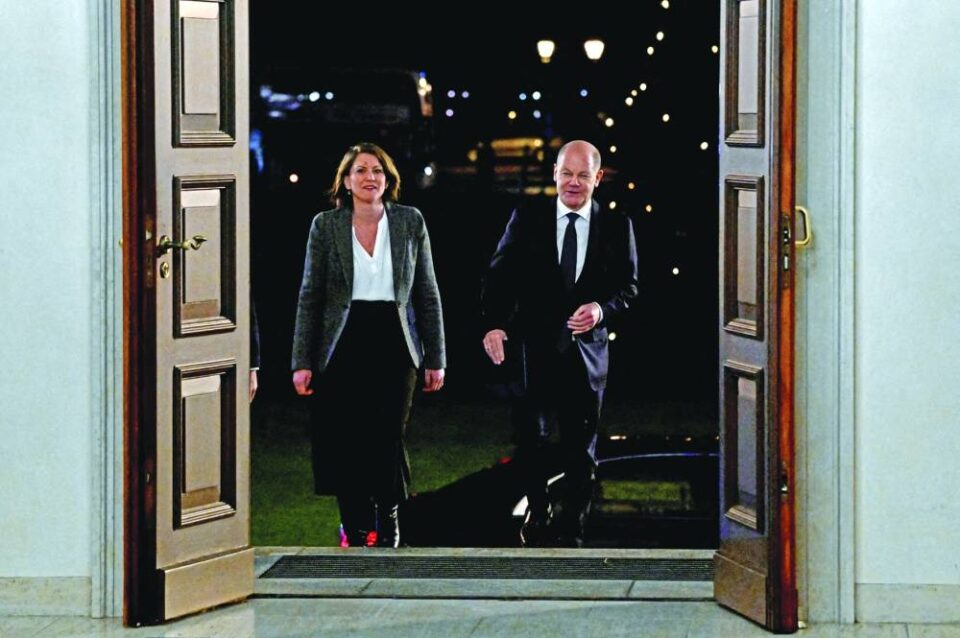German Chancellor Olaf Scholz lost a confidence vote yesterday, spelling the effective end of his troubled government and putting Europe’s biggest economy on the path to elections on February 23.Scholz had called the vote, expecting to lose it, weeks after his coalition collapsed. Later yesterday he asked President Frank-Walter Steinmeier to dissolve the legislature soon and ask voters to head back to the ballot box.Although the centre-left chancellor continues in a caretaker role and with a minority in parliament, the political turmoil threatens months of paralysis until a new coalition government is formed.Embattled Scholz, 66, lags badly in the polls behind conservative opposition leader Friedrich Merz who heads the Christian Democratic Union (CDU) of ex-chancellor Angela Merkel.After more than three years at the helm, Scholz was plunged into crisis when his unruly three-party coalition collapsed on November 6, the day Donald Trump won re-election to the White House.The political turbulence has hit Germany as it struggles to revive a stuttering economy hammered by high energy prices and tough competition from China.Berlin also faces major geopolitical challenges as it confronts Russia over the Ukraine war and as Trump’s looming return heightens uncertainty over Nato and trade ties.Those threats were at the centre of a heated debate between Scholz, Merz and other party leaders ahead of the vote in the lower house, in which 207 MPs expressed confidence in Scholz against 394 who did not, with 116 abstentions.After Scholz outlined his plans for massive spending on security, business and social welfare, Merz demanded to know why he had not taken those steps in the past, asking: “Were you on another planet?”Scholz argued that his government had boosted spending on the armed forces which previous CDU-led governments had left “in a deplorable state”.“It is high time to invest powerfully and decisively in Germany,” Scholz said, warning about Russia’s war in Ukraine that “a highly armed nuclear power is waging war in Europe just two hours’ flight from here”.But Merz fired back that Scholz had left the country in “one of the biggest economic crises of the post-war era”.“You had your chance, but you did not use it … You, Mr. Scholz, do not deserve confidence”, charged Merz.Merz, a former corporate lawyer who has never held a government leadership post, lambasted the motley alliance of the chancellor’s Social Democrats (SPD), the left-leaning Greens and the liberal Free Democrats (FDP).Coalition bickering over fiscal and economic woes came to a head when Scholz fired his rebellious FDP finance minister Christian Lindner on November 6.Scholz yesterday again lashed out at Lindner for the “weeks-long sabotage” that finally imploded the alliance and damaged “the reputation of democracy” itself.The departure of Lindner’s FDP left Scholz running a minority government with the Greens that has been limping along, unable to pass major bills or a new budget.Berlin’s troubles come as Germany’s main EU partner France is also mired in a government crisis.German politics in the post-war era was long staid, stable and dominated by the two big-tent parties, the CDU-CSU alliance and the SPD, with the small FDP often playing kingmaker.The Greens emerged in the 1980s, but the political landscape has been further fragmented by the rise of the far-right Alternative for Germany (AfD), a shock for a country whose dark World War II history had long made right-wing extremist parties taboo.The AfD has grown in the past decade from a eurosceptic fringe party into a major political force when it protested against Merkel’s open-door policy to migrants, and now has around 18 percent voter support.While other parties have committed to a “firewall” of non-co-operation with the AfD, some have borrowed from its anti-immigration rhetoric.After the fall of Syrian president Bashar al-Assad, some CDU lawmakers were quick to demand that the around one million Syrian refugees in Germany return to their home country.

previous post